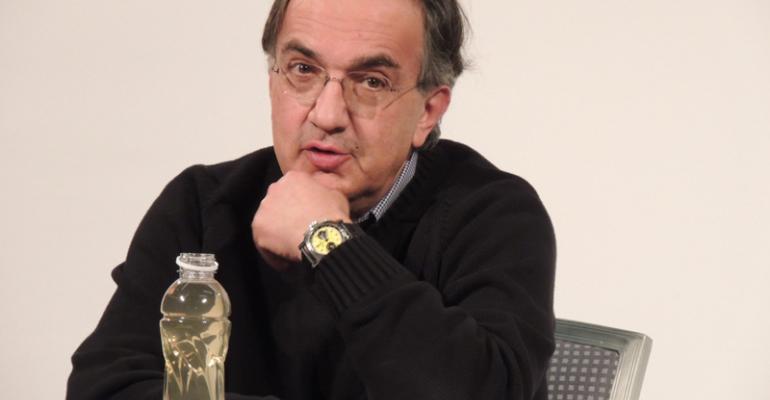GENEVA – Fiat and Chrysler CEO Sergio Marchionne says he did some simple arithmetic recently and found the quotient alarming.
“I calculated the amount of operating losses that were recorded by four of the large players in Europe, including ourselves, GM (General Motors), Ford and PSA (Peugeot Citroen) totaled about $7 billion in 2012,” he tells journalists at the auto show here.
“That’s a situation that cannot continue forever. Essentially, Europe is being subsidized by the global operations of these car makers.”
Based in Italy, which is among the southern European nations struggling economically because of the regional debt crisis, Fiat’s European operations have lost money for several years. “This problem has been chronic,” Marchionne says.
The core of the issue, as it was when GM and Chrysler landed in bankruptcy in the U.S. in 2009, is twofold: Consumers in much of Europe lack resources to buy new cars, and auto makers retain too much capacity to manufacture fewer vehicles.
Marchionne says Fiat has “done our part” to alleviate overcapacity by shuttering a plant in Sicily two years ago, but he admits the auto maker’s Italian plants have been “substantially underutilized for quite a while.”
He hedges when asked whether Fiat has shut down enough operations. “A lot of it depends on what happens to demand. The capacity/demand issue in Europe is a very difficult equation. I think there have been some courageous actions taken by some of our competitors outside of Italy.”
If the economy continues to languish and auto makers do not voluntarily reduce capacity, the industry faces the real possibility of one or more auto makers suffering “structural failures,” such as the inability to pay employees or suppliers.
“God forbid that there is a structural failure,” Marchionne says. “So something needs to give.”
He sees two options for Europe: Either demand recovers to fill the plants or the recovery doesn’t happen quickly enough and forces a reduction in capacity that a company can manage carefully.
Marchionne suggests auto makers failing to recognize the inevitable run the risk of a much messier form of downsizing. Or governments could step in with financial relief, as occurred in the U.S. during the 2009 bankruptcies.
“I think there is a less than 50% chance that in Europe you will see a structural failure simply because the economic environment and social framework in which we operate will not allow it to happen. I think you will see state intervention before that happens.”
However, government funding isn’t the answer, either, he says. The European auto industry lacks an oversight mechanism to manage capacity and balance it with demand to avoid the kind of meltdown that exists today.
Without such regional oversight, Marchionne considers government relief “only a stopgap measure. It creates an uneven playing field for others in the business. So these are situations that ought to be avoided.”
Some downbeat automotive executives suggest the market will remain in the doldrums for up to five years, but Marchionne is more optimistic. “My expectation is that we’ll see a recovery in 2014 of some fashion,” he says, adding European leaders need to find the “collective will” and common ground in crafting a regional solution.
“I think this is a collective European objective, trying to get Europe out of the condition it’s in. It is a very difficult time here. I think people are underestimating the complexity of the problem in terms of the impact on the social fabric of the member countries.”
In Greece, where violence has resulted from government-imposed austerity measures, Marchionne refers to residents there living with “a high degree of discomfort.” Likewise, “We have seen spontaneous reaction to the austerity measures both in Spain and Portugal.”
As for his home country of Italy, Marchionne says political turmoil over leadership “leaves it in an even more tenuous condition. And things aren’t getting better.
“We’re seeing substantial reductions in consumption in the weak European countries, and the problem is, it cannot continue,” he says. “You’re destroying the underlying fabric of the economy. People who keep arguing that austerity is the way to salvation are probably misjudging the real impact on peoples’ lives, and this is no longer sustainable.”
Specific to Fiat’s situation, Marchionne says it’s unfair of some to suggest Chrysler is shouldering the financial burden, reminding that Fiat’s South American operations are solidly profitable, as are its premium brands such as Ferrari.
Asked by WardsAuto if Fiat’s European problems today are more severe than Chrysler’s in 2009, Marchionne answers decisively.
“They are much worse here,” he says, noting the Obama Admin. led Chrysler’s restructuring. “I see no similar initiative (in Europe). It’s up to the single car companies to come up with a solution, and everybody’s struggling to find their way forward.”
Does he see bankruptcy as an option for Fiat?
“Let me put it this way,” he says, noting Fiat Group worldwide earned €3.7 billion ($4.8 billion) before interest and taxes in 2012. “The likelihood of Fiat going bankrupt is probably lower than you getting hit by lightning in this room here today.”
Says a European journalist: “I’m taking cover.”




